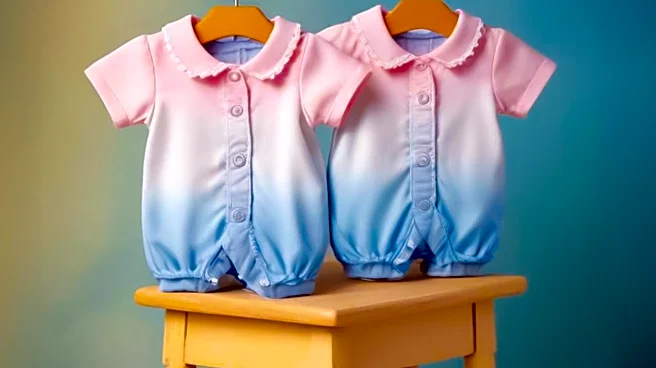What's Happening?
Jenna Hutchison, a mother from Queensland, Australia, faced a harrowing decision when her unborn identical twin girls were diagnosed with Twin to Twin Transfusion Syndrome (TTTS), a condition that affects blood flow between twins sharing a placenta. Doctors
advised Hutchison to consider saving the stronger twin, Lily, and ending the life of the weaker twin, Ivy, due to the risks involved. Despite the high-risk nature of the pregnancy and the potential for severe outcomes, Hutchison chose to keep both twins, trusting her maternal instincts. The twins were born prematurely at 24 weeks, categorized as micro-preemies, and faced numerous health challenges, including brain bleeds and neonatal lung disease. After months in the NICU, both twins are now home and thriving.
Why It's Important?
The story highlights the ethical and emotional complexities faced by parents dealing with high-risk pregnancies. Hutchison's decision to keep both twins despite medical advice underscores the profound impact of parental instincts and the moral dilemmas in medical decision-making. The case also brings attention to TTTS, a condition affecting a significant percentage of identical twin pregnancies, and the advancements in neonatal care that can support micro-preemies. Hutchison's experience serves as a testament to the resilience of families navigating the challenges of premature births and the critical role of NICU teams in supporting these vulnerable infants.
What's Next?
Hutchison continues to share her journey on social media, raising awareness about TTTS and offering support to other parents facing similar challenges. Her advocacy may lead to increased public understanding and support for families dealing with high-risk pregnancies and premature births. The twins' progress will be closely monitored, with ongoing medical care to address their developmental needs. Hutchison's story may inspire further research into TTTS and improvements in prenatal and neonatal care.
Beyond the Headlines
The story raises broader questions about the ethical considerations in prenatal care, particularly in cases involving life-threatening conditions. Hutchison's refusal to choose between her twins challenges conventional medical advice and highlights the importance of respecting parental autonomy in decision-making. The emotional and psychological impact on families dealing with such dilemmas is profound, emphasizing the need for compassionate support systems. Hutchison's journey also illustrates the power of social media in connecting and empowering parents facing similar struggles.
















